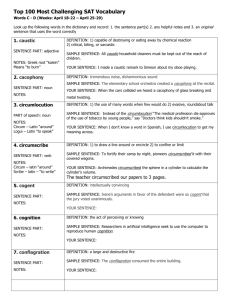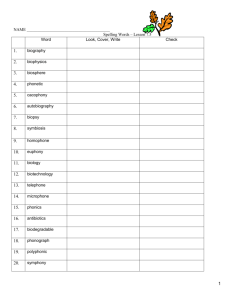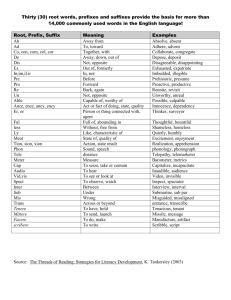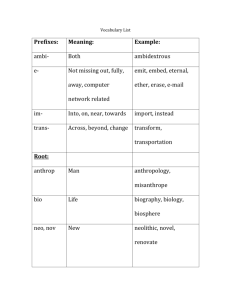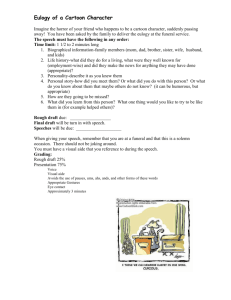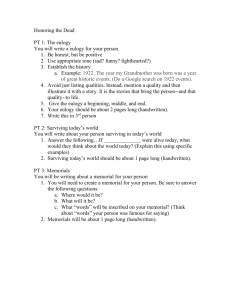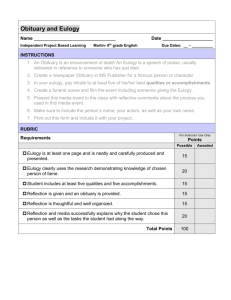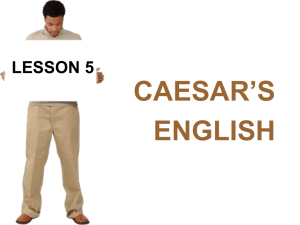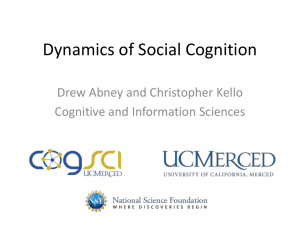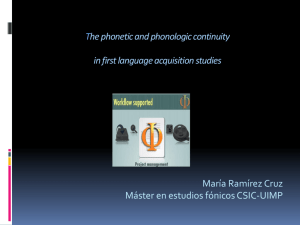Vocabulary Building: Roots, Prefixes, and Definitions
advertisement
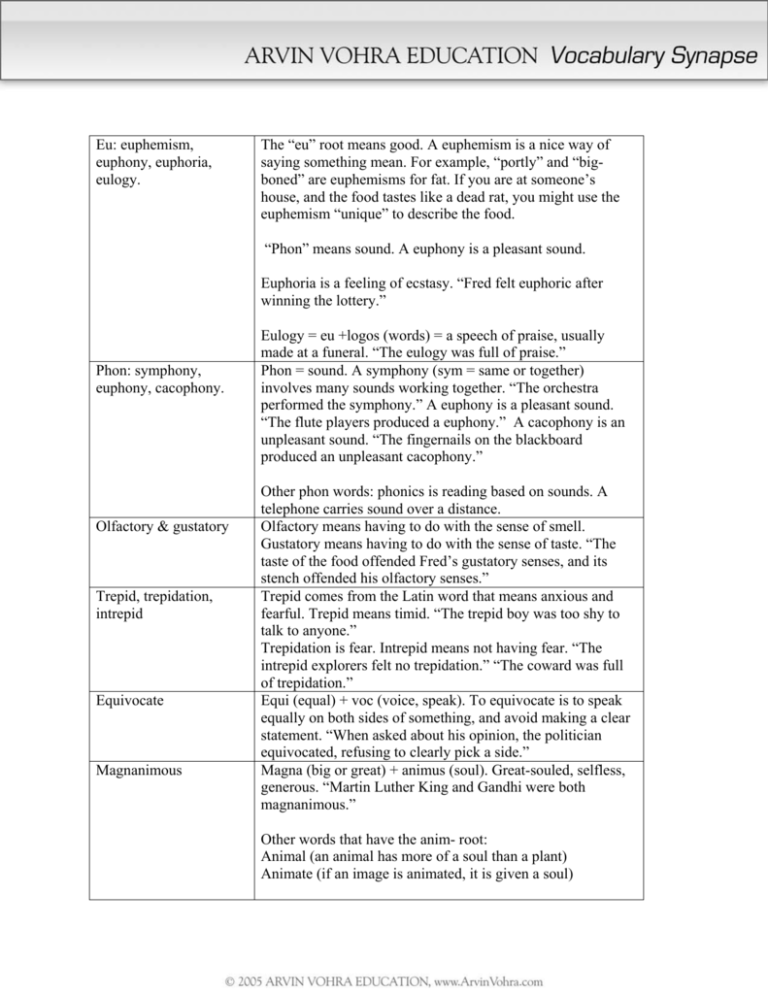
Eu: euphemism, euphony, euphoria, eulogy. The “eu” root means good. A euphemism is a nice way of saying something mean. For example, “portly” and “bigboned” are euphemisms for fat. If you are at someone’s house, and the food tastes like a dead rat, you might use the euphemism “unique” to describe the food. “Phon” means sound. A euphony is a pleasant sound. Euphoria is a feeling of ecstasy. “Fred felt euphoric after winning the lottery.” Phon: symphony, euphony, cacophony. Olfactory & gustatory Trepid, trepidation, intrepid Equivocate Magnanimous Eulogy = eu +logos (words) = a speech of praise, usually made at a funeral. “The eulogy was full of praise.” Phon = sound. A symphony (sym = same or together) involves many sounds working together. “The orchestra performed the symphony.” A euphony is a pleasant sound. “The flute players produced a euphony.” A cacophony is an unpleasant sound. “The fingernails on the blackboard produced an unpleasant cacophony.” Other phon words: phonics is reading based on sounds. A telephone carries sound over a distance. Olfactory means having to do with the sense of smell. Gustatory means having to do with the sense of taste. “The taste of the food offended Fred’s gustatory senses, and its stench offended his olfactory senses.” Trepid comes from the Latin word that means anxious and fearful. Trepid means timid. “The trepid boy was too shy to talk to anyone.” Trepidation is fear. Intrepid means not having fear. “The intrepid explorers felt no trepidation.” “The coward was full of trepidation.” Equi (equal) + voc (voice, speak). To equivocate is to speak equally on both sides of something, and avoid making a clear statement. “When asked about his opinion, the politician equivocated, refusing to clearly pick a side.” Magna (big or great) + animus (soul). Great-souled, selfless, generous. “Martin Luther King and Gandhi were both magnanimous.” Other words that have the anim- root: Animal (an animal has more of a soul than a plant) Animate (if an image is animated, it is given a soul) Other words with magna: Magnify = magna (big) + fy (make). Magnify means to make something bigger. Magniloquent = magni (big) + loq (speak). Magniloquent means speaking in a large, extravagant way. Circum: circumvent, circumspect, circumambulate, circumnavigate, circumscribe, circumlocution Circum means around. Circumvent means to go around, or to avoid. “Fred circumvented the city to avoid the traffic.” Or “Fred circumvented the rules and did whatever he wanted.” Spect means to look or see. Circumspect means cautious, because a cautious person looks around before doing something. “The circumspect person checked all the rules before doing anything.” Ambulate means to walk. Circumambulate means to walk around something. “We circumambulated the building.” Navigate means to sail. Circumnavigate means to sail around something. “Magellan circumnavigated the earth.” Scribe means to write. Circumscribe means to limit, which is like drawing a boundary around something. For example, “The new law circumscribes personal freedoms.” “loc” and “loq” mean to speak. Circumlocution is talking around the subject. “Instead of getting to the point, the politician resorted to circumlocution.” Evanescent, ephemeral, transient, fugacious Lasting for a short period of time. Evanescent has the same “van” root as “vanish.” “The memory of the dream was evanescent.” “A mayfly, which lives for a day, has an ephemeral life.” Trans=across. Something transient goes across quickly; basically it lasts for a short period of time. “The fad was transient; it only lasted for a day.” Transient can be used as a noun, to describe a person who stays somewhere for only a short time. “The homeless shelter was full of transients.” Fugacious has the same root as fugitive. A fugitive escapes from a place quickly. Similarly, something fugacious disappears quickly. “The fugacious fad lasted for only a day.” Prosaic Prose is writing that is not poetry. Essays, novels, and textbooks are all written in prose. Prose is more ordinary than poetry. Thus, prosaic means boring or excessively ordinary. “The accountant lead a prosaic life; it was boring and ordinary.”
